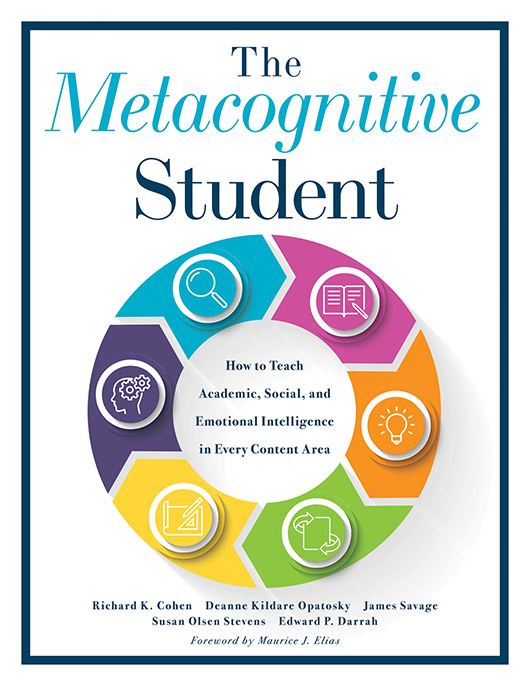Free Reproducibles
The Metacognitive Student
How to Teach Academic, Social, and Emotional Intelligence in Every Content Area
What if there was one strategy you could use to support students academically, socially, and emotionally? It exists—and it’s simple, straightforward, and practical. In this results-focused resource, the authors dive deep into the what and how of structured SELf-questioning. Begin using this powerful academic and socioemotional approach in your own classroom to develop students into thriving thinkers who are confident, healthy, adaptive, and resilient.
Benefits
- Grasp the severity of the stress and anxiety teachers and students face in schools and how metacognitive SELf-questioning can reduce both.
- Learn to implement effective SELf-questioning into instruction to foster social-emotional learning (SEL).
- Review scenarios that depict use of the SELf-questioning strategy in every content area and grade level.
- Gain insight into how advanced SELf-questioning can achieve transfer of learning in the classroom to any academic or social context.
- Autonomously customize and create your own SELf-question sets and apply them to any situation within or outside of school.
Table of Contents
Chapter 1: Metacognition and SELf-Questioning: The Underpinnings of the Strategy
Chapter 2: Structured SELf-Questioning for Academic Problem Solving in Mathematics
Chapter 3: Structured SELf-Questioning for Social Problem Solving
Chapter 4: Structured SELf-Questioning in Reading Comprehension
Chapter 5: Structured SELf-Questioning in Reading Decoding
Chapter 6: Structured SELf-Questioning for Inquiry-Based Research Writing
Chapter 7: Structured SELf-Questioning for Emotional Recognition
Chapter 8: Structured SELf-Questioning for Emotional Regulation and Problem Solving
Chapter 9: Transfer Theory and SELf-Questioning
Chapter 10: Structured SELf-Questioning for Social Studies
Chapter 11: Structured SELf-Questioning and Metacognitive Components in Science
Chapter 12: Autonomous Use of SELf-Questioning and Metacognition
Epilogue
Appendix
STUDY GUIDE
PRINTABLE REPRODUCIBLES
Chapter 1
Chapter 7
Chapter 8
Chapter 11
Chapter 12
Appendix
- Academic and Social Problem-Solving Poster
- Emotional Problem-Solving Poster
- Academic and Social Problem-Solving Think Sheet: Design 1
- Emotional Problem-Solving Think Sheet: Design 1
- Academic and Social Problem-Solving Think Sheet: Design 2
- Emotional Problem-Solving Think Sheet: Design 2
- Linking Cognitive Verbs in CCSS and SELf-Questions
SUGGESTED RESOURCES
Books
- Brendtro, L. K., Brokenleg, M., & VanBockern, S. (2019). Reclaiming youth at risk: Futures of promise (3rd ed.). Bloomington, IN: Solution Tree Press.
- Colburn, L., & Beggs, L. (2021). The wraparound guide: How to gather student voice, build community partnerships, and cultivate hope. Bloomington, IN: Solution Tree Press.
- Jensen, E. (2019). Poor students, rich teaching: Seven high-impact mindsets for students from poverty (Rev. ed.). Bloomington, IN: Solution Tree Press.

